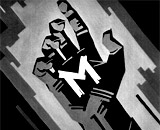
|
M (1931, Ger.)
In Fritz Lang's highly-influential, first sound film
- an expressionistic thriller about the controversial subject of
homicidal pedophilia, and a child molester/murderer who terrorized
the German city of Berlin:
- the opening scene of young Elsie Beckmann (Inge
Landgut), after school, bouncing her ball against a billboard,
and the shadow of psychopathic Berlin child-killer/molester Hans
Beckert (Peter Lorre) moving over the poster of the billboard that
offered a reward (reading "10,000 Marks of Reward - Who is
the Murderer?"); in silhoutte Beckert leaned down and spoke
to the girl: ("You have a very beautiful ball. What's your
name?...")
- with his back to the camera, the scene of Beckert's
purchase of a balloon (while whistling a few bars of his tell-tale In
the Hall of the Mountain King from Peer Gynt's Suite #1 by Edvard
Grieg) from a 'blind man' peddler (Georg John) in order to seduce
the young girl
- soon after, Elsie's place setting at the table was
unoccupied and both the ball (bouncing away onto the grass) and the
balloon (floating away into telephone lines) were seen - signifying
the girl's abduction and murder; an extra edition of the newspaper
reported how another young kidnap-murder victim had been claimed
(the 9th victim)
- the scene of Beckert's grotesque making of faces
before a mirror, as investigators reported on the results of handwriting
analysis of the killer's anonymous letter to the newspapers
- the killer's urge to strike again, when he stood at
a store window - and in a reflection, he noticed a young girl behind
him; he grimaced and moved his hand to his mouth; when she walked
away behind him, he turned toward her direction and began nervously
whistling his tell-tale tune as he followed after her, but he was
thwarted when the girl met her mother; to fortify himself, he sat
down at an outdoor cafe and ordered himself two stiff cognac drinks
|
Beckert's Urge to Kill Again
|

|
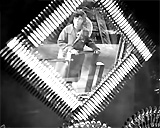
|
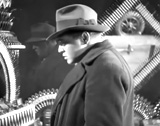
|
- the scene of the blind balloon-seller hearing once
again the familiar whistled tune - he recognized it and said to
himself: "Wait! Didn't I hear that before? It was - it was...Listen
to that, that whistle there"; he called over a friend - a
young pickpocket named Heinrich (Carl Balhaus), who saw the whistler
walking away with another young girl; the blind man asked Heinrich: "Can't
you hear it? There....Have you seen the man who was whistling?...The
day when little Elsie Beckmann was murdered, a man bought a balloon
from me and there was a little girl with that man. And, and that
man was whistling too like the man there"; Heinrich pursued
after Beckert and saw him purchasing a gift at a candy store for
the young girl; Heinrich marked a large "M" in chalk
on his hand, and then struck Beckert on his left shoulder on the
back of his overcoat (he pretended to trip on one of Beckert's
discarded orange peels on the sidewalk) - in order to brand him
with the mark of Cain as an atrocious child-murderer; the innocent
young girl ominously handed Beckert back his dropped peeling knife
- the scene of Beckert's discovery that he was marked
with a stain - the little girl told him: "You're stained with
something white...There on your shoulder"; Beckert looked backward
toward his reflection and realized that he had a letter 'M' (meaning "Morder")
chalked on the back of his overcoat at shoulder level
- the criminal underworld beggars pursued Beckert, eventually
seized him, and set him up for a trial to condemn him for his hideous
string of crimes
- the best scene in the film was the lengthy sequence
in the kangaroo court in a distillery warehouse - at first Beckert
denied everything, but was then accused by the blind balloon-seller
of purchasing a balloon for the victim Elsie; Beckert vainly tried
to escape from the cellar, but was assaulted and thrown to the floor;
although he claimed that they had no right to hold him prisoner or
to "neutralize" him, Beckert started to incriminate himself
due to the dark forces within him; the tortured, sniveling, mass-murdering
offender piteously cried out to defend his actions - and claiming
that he was not responsible for his own cursed actions: ("But
me, can I behave - can I behave any different? Is it that I don't
have this curse inside of me? This fire? This voice? This torment?...I
always have to go down the street, and I always feel it behind me.
It's myself! And I follow me! In silence. But I can hear it. Yes,
sometimes it's like I'm chasing myself. I want to - I want to escape
from myself. But I can't. I can't escape from myself. I must - I
must follow the way that's chasing me. I must run, run down endless
streets. I want to get away. I want to get away. And, running with
me, the ghosts of the mothers and the children. They never go away.
They're always there! Always! Always! Always! They only disappear
when I do it. When I --- Then, I don't remember anything. Then, then
I'm standing in front of a sign and I read what I've done. And I
read and read. Have I done that? But I can't remember any of that.
And who's going to believe me? Who knows what it's like to be me?
How it calls me and screams inside of me! How I must do it! I don't
want to! I must! I don't want to! I must! And then a voice screams!
And I can't hear it anymore. Help! I can't! I can't. I can't! I can't!")
Beckert in the Kangaroo Court Trial -
Held by Underworld Leaders and Beggars
|

|

|
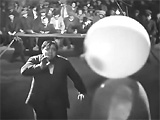
|

|

|

|
- the decision of the members of the court was murderous
and unmerciful - declaring that Beckert had just signed his own
'death sentence': "That man must be eliminated. That man must
disappear"
- the mothers of the victims and others in the gallery cried out:
"No mercy for the murderer. No mercy. Down with the murderer.
He should be killed. Annihilate the beast! Kill him! Kill that animal!
Dead! Murder him! Kill him! Away with him! Away with the beast! Kill
him! Kill him!"
- at the end of the accusations, the police intervened
(off-screen) - everyone surrendered and raised their hands- and
"in the name of Law," a real trial was held; Beckert was
prosecuted in a traditional courtroom (where his insanity and illness
were taken into account)
- in the film's conclusion during the trial's announcement
of the verdict by the chief judge , the mothers of three of the victims
watched in the trial gallery - still in mourning, Elsie's mother
Frau Beckmann (Ellen Widmann) warned: "This will not bring our
children back to life. People should take better care of their children"
|

Shadow of Child-Killer

Purchase of Balloon from Blind Man for Elsie

After the Murder, Beckert's Face-Making at Mirror

Blind Balloon-Seller: Recognizing the Familiar Whistled
Tune

Beckert Grooming His Next Victim

The Chalk "M" Brand
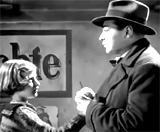
Young Girl Handing Beckert His Knife


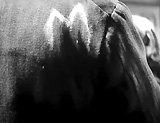
Beckert Marked with "M"
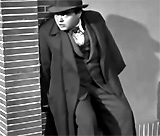
Beckert - Pursued
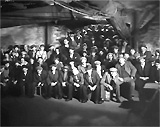

The Kangaroo Court Trial Attendees and 'Judges'

Elsie's Mother During Reading of Verdict: "This will
not bring our children back to life..."
|















